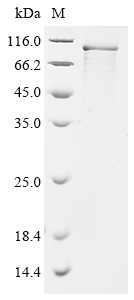Recombinant Human MAVS is expressed in E. coli and contains the 1-513 amino acid region of the protein. The product is tagged with an N-terminal 6xHis-GST to help with purification and detection. Purity is greater than 85% as confirmed by SDS-PAGE analysis. This protein is intended for research use only and is not for use in diagnostic or therapeutic applications.
The Mitochondrial antiviral-signaling protein (MAVS) appears to play a crucial role in the innate immune response. It is involved in the signaling pathway that mediates antiviral defense mechanisms by activating downstream transcription factors. MAVS seems essential for the induction of type I interferons and other cytokines in response to viral infections, making it a significant focus in immunological research.
Potential Applications
Note: The applications listed below are based on what we know about this protein's biological functions, published research, and experience from experts in the field. However, we haven't fully tested all of these applications ourselves yet. We'd recommend running some preliminary tests first to make sure they work for your specific research goals.
Based on the provided information, the folding state and bioactivity of this recombinant human MAVS protein are unknown and must be considered highly uncertain. MAVS is a critical signaling adaptor protein that normally localizes to the mitochondrial membrane and functions by forming large, active prion-like filaments upon activation. Expressing a fragment (1-513aa, which may lack the crucial C-terminal transmembrane domain for mitochondrial targeting) in the reducing cytoplasm of E. coli with a very large N-terminal GST tag makes it extremely unlikely that the protein will adopt its native, functional conformation. The GST tag alone (26 kDa) is a large fusion partner that can significantly impair the folding and oligomerization capacity of the target protein. Therefore, it is highly probable that this protein is not correctly folded or bioactive for its specific role in antiviral signaling. Applications relying on its specific, native protein-protein interactions are not feasible.
1. Antibody Development and Validation
This recombinant MAVS fragment is suitable for use as an immunogen to generate antibodies. The large size of the fragment provides many potential epitopes. However, it is crucial to understand that the antibodies generated will be against the linear epitopes of this non-native, misfolded protein. Their ability to recognize the correctly localized, oligomeric, and activated form of MAVS in human cells is very low and requires rigorous validation. The protein is most reliable for developing antibodies that detect denatured MAVS in Western blots.
2. Biochemical Characterization and Stability Studies
This purified recombinant MAVS protein is well-suited for basic biochemical and biophysical characterization. Researchers can analyze its thermal stability, aggregation state, and solution behavior using techniques like size-exclusion chromatography or differential scanning fluorimetry. This application is valid and independent of the protein's native bioactivity, as it focuses on the intrinsic physical properties of the purified polypeptide.
Final Recommendation & Action Plan
Given the near certainty that this MAVS protein fragment is misfolded and inactive due to its expression context and large fusion tag, the recommended course of action is to restrict its use to non-functional applications. It can be reliably used for antibody production (Application 2, with the explicit goal of generating tools for detecting denatured MAVS) and for basic biophysical characterization (Application 3). Protein-protein interaction studies should be abandoned entirely with this protein lot, as they will not produce biologically relevant data and could lead to erroneous conclusions. For functional studies, an active, full-length MAVS protein would need to be produced in a more appropriate system, potentially involving in vitro tr2nscription/translation or expression that allows for proper membrane association and oligomerization.






